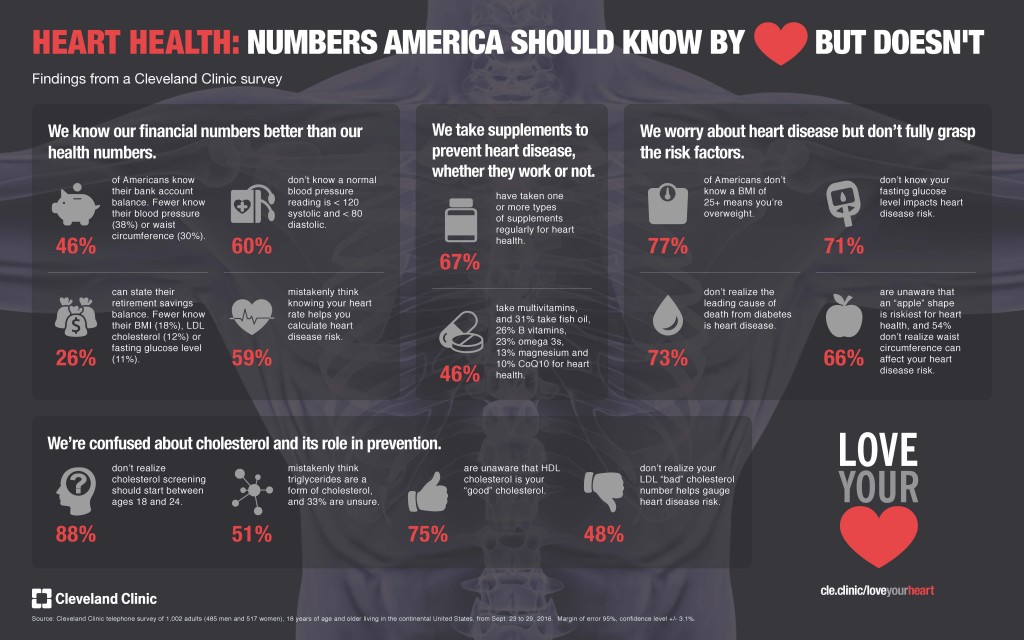Cleveland Clinic Survey Reveals Americans Worry About Dying From Heart Disease, But More Know Their Bank Balance Than Their Blood Pressure
A Cleveland Clinic study shows that while 68 percent of Americans are worried about dying from heart disease, many don’t know the basic numbers important for heart health.
The survey found most people know the numbers that are key to their financial wellbeing, but they’re not as savvy when it comes to their health. For example, nearly half (46 percent) of those surveyed knew their bank account balance, while just 18 percent could state their body mass index (BMI) and only 38 percent knew their blood pressure.
Heart disease is the No. 1 cause of death in the United States and around the world. While some risk factors for heart disease are not modifiable, others such as blood pressure, cholesterol, BMI, waist circumference, glucose and weight are alterable. While many people did know the risk factors, less knew the healthy range for them. Only four in ten Americans knew a healthy blood pressure reading was less than 120/80. Also, while half (52 percent) are aware BMI is an important factor, only a quarter (23 percent) know that a person is considered overweight with a BMI of 25 or more.
“Studies have suggested the majority of coronary artery disease events can be prevented by addressing treatable risk factors,” said Steve Nissen, M.D., chairman of Cardiovascular Medicine at Cleveland Clinic. “That means, a little knowledge regarding your ‘numbers’ could go a long way to helping keep your heart healthy and avoiding future problems.”
The survey was conducted as part of Cleveland Clinic’s “Love your Heart” consumer education campaign in celebration of American Heart Month. Cleveland Clinic has been ranked the No. 1 hospital in the country for cardiology and cardiac surgery for 22 years in a row by US News & World Report.
Additional survey findings include:
- Cholesterol confusion: Only one-fourth of Americans know that HDL is the “good” cholesterol. A mere 12 percent of Americans know they should start getting screened for cholesterol between ages 18-24. Also, most Americans think triglycerides are cholesterol, when in fact, they are a type of fat in the blood. Only half of Americans (52 percent) know that LDL cholesterol is an important number to know to understand their risk of heart disease.
- Apple or Pear? Only one-third (34 percent) of Americans know that fat in the stomach region (an “apple-shaped body”) is most dangerous for heart health. In addition, only 36 percent knew their waist circumference was an important factor in determining heart disease risk.
- Turning to Supplements: The survey also revealed many Americans are looking to supplements to enhance their heart health. Nearly seven-in-10 (67 percent) Americans surveyed say they have taken one or more types of supplements regularly to enhance their heart health, although there is little evidence that supplements improve heart health. The most commonly taken supplements are multivitamins (46 percent), fish oil (31 percent) B vitamins (26 percent), omega 3s (23 percent) and magnesium (13 percent).
- Diabetes Disconnect: Many Americans don’t understand the strong connection between diabetes and heart disease. Most respondents (73 percent) didn’t realize the leading cause of death for people with diabetes is heart disease. The most popular response (35 percent) was kidney disease/failure.
“Heart disease causes 1 in every 4 deaths in the United States, so it’s troubling that so few Americans know the basics about their own heart health,” Dr. Nissen said. “Americans could take better control of their health by simply educating themselves about what factors are most important to their health.”
Methodology
Cleveland Clinic’s survey of the general population gathered insights into Americans’ perceptions of heart disease and exercise. This was a telephone survey conducted among a national probability dual-sample consisting of 1,002 adults, 485 men and 517 women 18 years of age and older, living in the continental United States. We have weighted the numbers to be nationally representative. Interviewing for this telephone survey (land line and cellphone combination used) was conducted by Braun Research and completed September 23-29, 2016. The margin of error at the 95 percent confidence level is +/- 3.1 percent.


